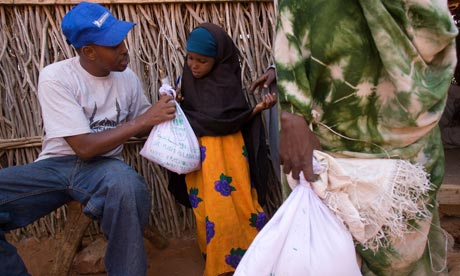
An Islamic Relief
worker during Kenya's 2006 drought. The agency's work in Somalia is in
doubt after an al-Shabaab ban. Photograph: Mike Goldwater/Alamy
In a statement on Twitter, al-Shabaab said it had officially revoked Islamic Relief's permit to work in areas under its control – an ill-defined territory, the frontiers of which have become ever more fluid since the al-Qaida-linked militants pulled out of the port city of Kismayo on 28 September with Kenyan troops and their Somali allies closing in.
British-registered Islamic Relief – funded by British and European donors, among others – was previously one of the few international organisations able to work directly in al-Shabaab territory.
The militants, who have imposed a harsh form of sharia law in the areas they hold, are deeply hostile to western aid agencies, and angered locals by banning food aid in the south during last year's drought, in which tens of thousands of Somalis died. Last November, they banned about 16 aid agencies from the south.
Iftikhar Ahmad Shaheen, regional director for east Africa at Islamic Relief, said al-Shabaab's tweet came as a shock, with staff on the ground given no warning of the militants' decision. "Normally, al-Shabaab will talk to you first, then they will show their dissatisfaction," he said. "We didn't hear anything from them whatsoever for the past month … The staff [in Somalia] didn't know anything."
Al-Shabaab said on Twitter: "Islamic Relief has repeatedly failed, despite the persistent warnings, to comply with the operational guidelines." It also said the group was "found covertly extending the operations of banned organisations, particularly WFP", referring to the UN's World Food Programme.
WFP has had no access to al-Shabaab areas since January 2010, and a spokeswoman in Nairobi said the agency was neither working directly nor indirectly with any humanitarian organisations in the areas controlled by al-Shabaab.
Shaheen also denied al-Shabaab's allegations. "I can testify that to the best of my knowledge, for the past five to six years, Islamic Relief has never worked with WFP in Somalia," Shaheen said.
Shaheen said his group would try to engage with al-Shabaab to resolve the situation. "If this decision is confirmed, it could put many lives at risk, jeopardising our work providing food, water, sanitation, healthcare and support for income generation to 1.3 million people in Somalia," he said.
Under pressure from African Union peacekeeping force Amisom, Somali troops and allied militias, the al-Shabaab militants have been forced to abandon a string of towns this year, taking refuge in the bush or resorting to hit-and-run attacks or suicide bombs in the capital Mogadishu and elsewhere. It is not clear where the rebels went after leaving Kismayo. In the past, they have abandoned towns or villages without engaging Amisom troops, only to launch attacks later.
Shaheen said his group's ability to continue working in the south, where Kenyan and Somali forces are extending their control of Kismayo, would depend on the tactics adopted by al-Shabaab as it adapts to life without a major base. Kismayo was a key financial asset for the militants, who earned money from charcoal exports and taxes levied on local businesses. "If they don't become hostile against the agency, we can continue working. It depends on the mode they take," Shaheen said.
Although the situation in Somalia has improved since last year, a report by Oxfam on Monday warned that food and water shortages were at critical levels in the south and likely to deteriorate.
Oxfam surveyed about 1,800 households across 40 regions and found 72% of those questioned were concerned about not having enough to eat during the next four months, with 42% saying they were skipping meals.
April to June rains were below average in many areas, and this hit harvests. Although there is little danger of another famine, Oxfam warned that southern Somalia – especially parts of the Gedo region, Lower Juba and Bakool – was still in crisis, especially given the conflict and risk of flooding during the October to January rains.
The Food Security and Nutrition Analysis Unit said in August that, while the number of people in need has decreased, approximately 2.12 million people would face food insecurity for the remainder of this year. It has estimated that 236,000 children in Somalia remain acutely malnourished.
With the rains due to start again soon, Somalia also faces the threat of flooding, which could contaminate its paltry existing water supplies and increase the risk of water-borne diseases such as cholera. There have already been floods in Hiran province.
http://www.guardian.co.uk/global-development/2012/oct/08/somalia-aid-al-shabaab-islamic-relief
No comments:
Post a Comment